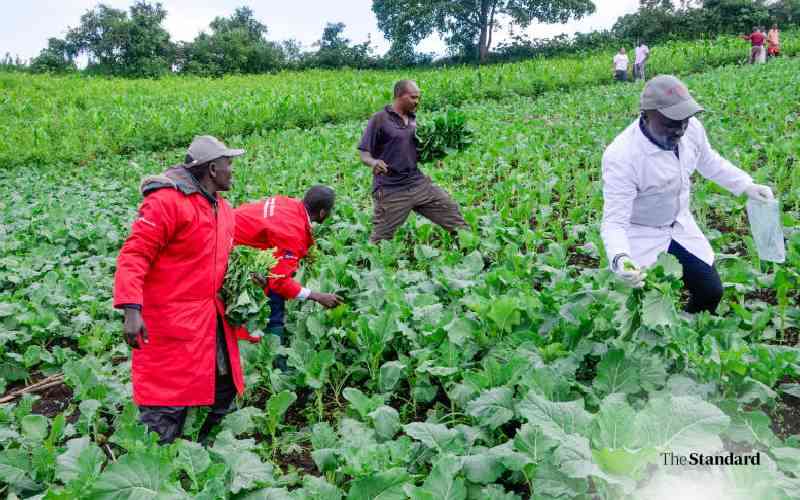Farmers lead Nakuru's growing food safety revolution

A gentle breeze rustles through rows of vibrant kales in Bahati, Nakuru County, their dew-laced leaves shimmering under the soft morning sun.
Walking briskly between the leafy rows in Joseph Mwangi, a seasoned farmer passionate not just about growing food but growing it safely.
For decades, Mwangi has tilled his farm, nurturing his crops from tiny seedlings to lush vegetables that now grace Nakuru’s bustling markets. His hands tell the story of hard work, but his heart tells the story of responsibility.
“I always say, if I cannot eat it myself, why should I sell it to someone else?” Mwangi says firmly, pausing to inspect a kale leaf for pests.
Mwangi’s journey began modestly on a small plot but quickly blossomed into a thriving agribusiness now spanning 10 acres. Of these, four acres are under vegetables like Kale, spinach, and cabbage - staples in many Kenyan households
What sets Mwangi apart is his meticulous care. He no longer relies on synthetic fertilisers like DAP, which he discovered were slowly damaging his soil. Instead, he uses farmyard manure and government-recommended inputs, focusing on soil health and sustainable yields.
But his strictest rules revolve around pesticide use. Mwangi admits that early in his career, he unknowingly harvested crops soon after spraying pesticides, risking consumer health.
“Back then, I did not know. But the training I have attended changed everything. Many farmers might still be doing the same out of ignorance. Awareness is urgently needed," he says.
Mwangi believes many health problems people face can be traced to consuming food laced with pesticide residue from rushed harvesting.
A stone's throw from Mwangi’s farm, Elijah Waweru tends to his one-acre kale farm. Unlike many who opt for herbicides, Waweru insists on manual weeding
“I prefer using people to cultivate and weed. It keeps my soil healthy and avoids unnecessary chemicals,” he says.
For Waweru, growing kale is about providing safe, healthy food while preserving the land for future generations.
“I always consult the local agricultural officer to ensure the right pesticides,” he says.
Mwangi and Waweru are part of a quiet revolution, a growing community of farmers committed to producing safe, healthy food.
Food safety remains a serious concern, especially in low and middle-income countries where unsafe food contributes to major health problems.
Stay informed. Subscribe to our newsletter
According to the World Health Organisation WHO, unsafe food causes an estimated 420,000 deaths globally each year, with children, the elderly, and people with weak immunity most affected.
The journey of these vegetables does not end at the farm. How they are handled, transported, and sold is equally critical.
Daniel Ogera, coordinator at Kuza Africa Foundation in Nakuru, is part of an initiative linking farmers directly to last-mile vendors, those who bring fresh produce to neighbourhood stalls.
“Food safety is not just about how it is grown, but how it is handled. We are working with the Global Alliance for improved Nutrition (GAIN) to train vendors on safe handling from clean crates to proper display practices,” he says
At their stalls, vegetables like kale, spinach, managu, and fruits like avocados are displayed and handled to maintain freshness and safety.
Margaret Njoki, a vendor at Kenlands estate in Nakuru, has fully embraced food safety practices after undergoing training.
“After being trained by FootFiti, I now know where my vegetables come from, who the farmer is, and how they are handled. I use a specific supplier, but some farmers spray chemicals and harvest too early just to make money. I sell what I can also confidently eat with my children,” she explains.
At the Free Area Fresh Food Market in Nakuru city, traders are adopting a new chapter in food safety with the introduction of a cold storage facility that is transforming how fresh produce is preserved.
Joseph Mugugu, a vegetable trader specialising in leafy onions, says the cold room has significantly reduced post-harvest losses.
“Before, we struggled to keep leafy onions fresh. Now, the cold room allows us to store them longer without compromising quality,” he says.
Beyond improving shelf life, the cold room has promoted better hygiene within the market.
“We used to throw away large amounts of spoiled produce, but now we waste far less,” Mugugu adds.
Traders follow strict guidelines, and no produce stays in the cold room for more than five days.
The facility, built by GAIN and handed over to the county government, has become a key asset in improving food safety.
“We keep everything clean and well-arranged. Nothing touches the floor, and produce is stored separately to prevent cross-contamination,” says Gabriel Wambugu, the Market chairman.
Kelvin Wafula, GAIN’s Nakuru county coordinator, says the ongoing efforts at local markets like Free Area Fresh Food Market are part of a broader push to improve food safety from farm to fork.
“We have trained traders on safe handling and hygiene based on the international Codex standard. Regular chemical residue tests conducted by agencies like CropNuts ensure vegetables meet safety requirements,” Wafula explained.
Wafula says they work closely with the county multi-agency food safety committee, bringing together departments of agriculture, public health, nutrition, and trade is driving these efforts through awareness campaigns and community sensitisation.
“Contamination can happen at any point in the food chain and is often difficult to detect. Without proper controls, unsafe food threatens both health and livelihoods,” Wafula warns.
He emphasises the link between food safety and nutrition
“We are promoting safe vegetable consumption among low-income families, especially urban and peri-urban areas in Nakuru. It is about improving diets for millions while supporting safer food systems,” he says.












